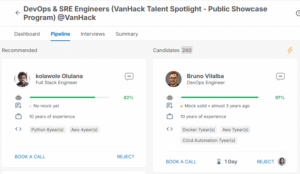One of the reasons why women don’t apply for tech jobs abroad is because of impostor syndrome. After having helped over 1800 software developers and other tech talents kick-start their international careers, we notice many candidates miss out on incredible opportunities because they don’t think they are qualified. Courtney Boudreau, our training specialist, sat down with Renée Leclair, principal client engineer manager at IBM, to discuss how to overcome imposter syndrome when you are a woman in tech.
In this webinar, we want to help you face all those moments you think you are not enough, how you can talk to yourself, and understand why those feelings are stopping you from doing what you have always dreamed of.
Renée is an entrepreneurial and empathetic leader with a “say what I think, think what I say” approach. Renee thrives on enablement and removing roadblocks with her team focused on the passion for technology and collaborative success.
What is Imposter Syndrome
According to Psychology Today, “people who struggle with imposter syndrome believe that they are undeserving of their achievements and the high esteem in which they are, in fact, generally held. They feel that they aren’t as competent or intelligent as others might think—and that soon enough, people will discover the truth about them. Those with imposter syndrome are often well accomplished; they may hold high office or have numerous academic degrees”.
Do you see yourself in this description? If you do, Renée wants you to consider the syndrome as something to be aware of, not to beat yourself up about. Feeling “less than” is a cultural phenomenon of our times and having your intellectual abilities taken for granted is a reality many women face or have faced throughout life.
How it manifests and what it looks like
One important aspect of feeling undeserving is the weight criticism carries in your mind. Getting negative feedback or failing to get a long-wanted promotion hurts and it’s ok to be sad. The problem shows itself when criticism seems to become a person’s whole identity and destroy everything else.
It happens when you get negative feedback at work and instantly start thinking “Everything else that was said that was not good now identifies me as an entire person and I am horrible. This one piece of feedback has painted my whole career as bad”.
Renée says the disproportional reaction is based on a need to protect oneself. “It comes down to a fear of being found out as a fraud or a fake”, she explains.
Some examples of how this mindset manifests itself would be through:
- Difficulty internalizing your abilities – (This is something I do well but I don\’t want to talk about it, because maybe they will find something wrong with it)
- Downplaying achievements – (I did something well but could have done it better)
https://blog.vanhack.com/blog/lets-break-excluding-stereotypes-to-strengthen-women-in-technology/
The dangers of thinking you are not enough
The tech industry is a fast-paced one. Companies are always on the lookout for innovations, new solutions, and better ways to fix problems. In such a competitive market, drawing in self-doubt will cause you to miss out on growth opportunities. Not to mention the health impacts of carrying such a heavy burden.
Renée says some of the “symptoms” of imposter syndrome are: moving laterally in your career (afraid of trying to move upwards), not taking the next professional step, overthinking every decision, having poor sleep, feeling stressed out, and ultimately even burnout.
Note that working hard to achieve a goal is very different from overworking to unhealthy limits because you feel the need to prove you are worth it.
Types of imposter personas and how to overcome them
Renée presents the five personas by which imposter syndrome can be classified:
- The perfectionist: Is someone who micromanages everyone and only delegates when there is a lot of oversight involved. If you see yourself here, Renée suggests you take a look at your job description. Understanding what your role demands of you are a great way to be more efficient. “Sometimes you are not expected to be perfect, but to be a good team member, for example”, Renée says. Try working smarter, not harder.
- The superhero: Is a person who tries to master all skills and feels the need to do more work than anyone else. Again, the key here is to ask yourself if you are working hard because you have a tangible goal or because you think you\’ll be seen as incompetent if you don’t. “Sometimes you are a workaholic to mask the parts of you you don\’t think are great. The scary thought is ‘maybe if I do a lot no one will not notice that I am not good at this or that'”, Renée explains.
- The genius: Is the smarter person in the room and they make their work look easy. Seems awesome, right? But the imposter “genius” does not take on any new challenges because they always have to be on top of everything. Not mastering something equals shame. Renée says one way to overcome this type is working on being OK with not pleasing everyone all the time (and yes, this can be hard).
- The expert: Is someone who picks one thing they are good at and endlessly talks about how busy they are. The problem here is that usually, this type of imposter seems almost grateful for being busy because they are afraid of not being useful. They have an \”either you are overworking yourself or you are good for nothing\” kind of mentality that can be very unhealthy.
- The soloist: Is a person who does not ask for help and thinks he or she has to do everything by themselves. Is perceived as closed off and works under the mentality of getting the tasks done at all costs.
Overcoming imposter syndrome
The first step to overcoming imposter syndrome is accepting what\’s happening but not feeling defeated by it.
Renée believes that the way you perceive yourself is mostly established in childhood so completely changing it may not be possible. The best alternative is learning how to deal with your strengths and vulnerabilities in healthier ways.
Every time you recognize imposter syndrome patterns, try to get a better understanding of the situation by writing about it or talking to a friend. Renée suggests jotting down a few lines that describe: what the situation is, how you feel about it and how you are acting on the issue. If possible, try to determine if your behavior is similar to some of the personas we talked about. Then, think about possible alternatives.
One example would be: “I feel a sense of competitiveness with a close friend at work. This makes me feel bad, so I am acting super nice to compensate for it. Maybe I don\’t need to fix everything, maybe my friend feels like this because she comes from a competitive background”.
Tips and tricks on how to deal with imposter syndrome
Self-knowledge is a powerful tool for a healthier and happier life, but of course, it seems to take a lifetime to acquire. While we work on that, Renée leaves us with some go-to tips and tricks we can use when things get tough.
- Remember you earned your place at the table: your career is not an accident, and you have done something right to be where you are today.
- Think about your limits: how can you contribute to work projects from a healthy point of view? You don\’t have to be the best at everything all the time to be a valid professional. You can be a great contributor and team player.
- Journal: write down your accomplishments and how you feel about them. Journal about your small victories and remember the role you played to earn them.
- Change the way you talk to / about yourself: maybe sometimes you can just notice your negative self-talk and say to yourself \”not today imposter syndrome, today I am going to own my actions\”.
Act now!
Building a better relationship with your sense of self-worth will help you feel stronger, empowered and more equipped to deal with challenges. Is there any work situation you can think of right now that you could see from a different more generous perspective? Maybe it\’s a project you said no to, or a job opportunity you didn\’t apply to. Can you begin to tackle them now? Perfection is not required. You are enough and you are allowed to try, experiment, and even fail sometimes. You got this!
…
🌎 VANHACK, LinkedIn Talent Awards Winner 2021, is Canada’s most respected recruitment company. With more than 1,800 hires, VanHack is on a mission of increasing diversity and creating a borderless world. So if you are a software developer looking for a job abroad, in Canada, the US, or Europe, join VanHack today. 100% free for candidates, plus you will get all the preparation you need when your profile is shortlisted.
Visit our platform to become one of our many VanHackers hired abroad 😃
For success stories and tips about working in Canada, check out the VanHack Podcast 🎧
Check out the next VanHack event 🗓



